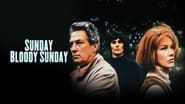lasttimeisaw
After surprisingly scooping Oscar's top honour with the X-rated MIDNIGHT COWBOY (1969), a feat hasn't been emulated ever since, John Schlesinger had earned more cachet and creative leeway to his next project, Sunday BLOODY Sunday, a seminal character examination about a bi-sexual young artist Bob Elkin (Head) in London and his simultaneous and mutually consented relationships with a middle-aged Jewish doctor Daniel Hirsh (Peter Finch) and a female recruitment consultant Alex Greville (Jackson), which allegedly is inspired by Schlesinger's personal affair with actor John Steiner.The description above might mislead you believe that Bob is the main focus point here, but, in fact, Penelope Gilliatt's awards-winning script installs the spotlight alternately on Daniel and Alex, one is cerebral, another is spontaneous. Not only they share the same man, unwitting to them, they also share the same telephone answering service (a diverting cameo from Bessie Love as the overworking answering lady), a source of gossip at then. Aptly, Gilliatt's script, Schlesinger's discreet directorial guideline and the cast's collective effort conspire to bring to light of the unconventional two-faceted relationships, in uttermost honesty, both under a personal emotion scale and a bigger social context, where the back-stories of Daniel and Alex are laid out in between sharp commentaries about a forbidding and shifting London at the turn of 70s, through the lens of tawdry installation art, news snippets from the car radio, pot-smoking kids under a liberal parenting guidance, midnight-awaiting addicts in the drugstore, the booming hippie culture, youth delinquents etc.Homosexuality, the elephant-in-the-room taboo, gets a more realistic and positive spin in this film, Daniel is still in the closet, but he is no longer being crucified, neither inwardly nor outwardly, in the regal bar mitzvah ceremony, he can swiftly mingle with his big Jewish family without being self- conscious or circumspect, Finch imbues Daniel with an air of unusual composure, which is so freshening to the clichéd preconception about queer drama, superbly outlined in his ending monologue, looking directly into audience's eyes, no shame, no trepidation, no big deal, Bob's departure is something doomed to happen sooner or later, he will still go to Italy, as planned, "I am happy, apart from missing him". It is just a cough, it will dissipate, eventually.In the other end of the line, Alex has experienced something more radical in her life, getting rid of a job she doesn't like, sleeping with an older man to offset her frustration in the status quo with Bob, or try to make him jealous (a corny and silly way to test the temperature of a relationship), which ends in vain, she is a woman still trying to figure out what she wants, the initially newfangled open- relationship starts to run out of steam, so, it is more natural for her to take a step back and Bob's departure couldn't be a more pertinent to offer her that chance. Jackson, disarms her steely angle and stays true to the image of a woman less characteristic and engrossing than the more progressive ones in her repertoire.Murray Head's Bob, an amorphous soul, a happy-go-lucky type doesn't restrain himself into any commitment or responsibility, he symbolises the zeitgeist of "free love"and "carpe diem", only Head's characterisation (maybe intentionally since his chief function is to mirror the differences between Daniel and Alex, while his own story is buried underneath without further scrutiny) leaves a drab presence (compared with Finch and Jackson), or shall we blame it on that horrible pageboy hairdo?. "You will not like his haircut, though", Alex banters with her mother, an excellent cameo from Peggy Ashcroft, yes, she is not joking at all.
rgcustomer
I get that this is an important film for its time. But I can't let that justify the ineptitude of filmmaking it represents.Actually, no, let's go back to that time. It presents one of cinema's few seriously-treated (and therefore politically viewed) bisexual characters as not simply compatible with a man and a woman, but inflicting painful half-relationships on both simultaneously. It's not a true love triangle, but a love vampire's V. Some people cannot commit, but it's not because they are bisexual. It's a shame that the film's then-refreshing portrayal of a gay man came at the expense of a stereotyped bisexual.But back to now. It's annoying watching two people who have no interest in each other try to share the same self-centred third person romantically, knowing full well what the end result is going to be. I just couldn't care about any of them.Then, those kids. They were straight out of a horror movie. The less said about them, the better. Except: that scene with the dog... it's both gratuitous and laughably-executed.I did feel that the filmmaker at least made an attempt to place our two doomed lovers into current and past context, but these scenes just jumped out of nowhere, for no apparent reason. They didn't really help explain the characters at all.The picture itself, the colours that ended up on film, ... just dreary.But at least we have footage of period phone technology. Where would we be without that?!What would I recommend instead? I don't think I know of any with a plot like this. But some dealing with bisexuality or love triangles are: Les chansons d'amour (2007), The Dreamers (2003), both starring Louis Garrel. Y tu mamá también (2001).




